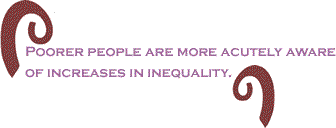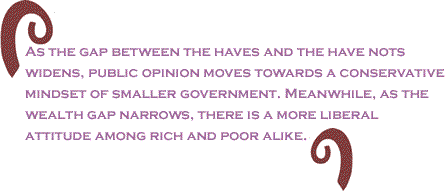Sometimes
we are our own worst enemies.
So the poor are conspiring with the wealthy, against their
own self-interests, to keep themselves in poverty. How
is it that economic inequality makes the poor more conservative and in opposition to government programs that are designed
to fight inequality?

A new study by Nathan J. Kelly and Peter K.
Enns suggests that income inequality is a self-perpetuating
phenomenon. Based on responses to survey questions from
1952 to 2006, the authors concluded that as the gap between
the haves and the have nots widens, public opinion moves
towards a conservative mindset of smaller government. Meanwhile,
as the wealth gap narrows, there is a more liberal attitude
among rich and poor alike.
Oddly, according to the authors, despite all of this, poorer
people are more acutely aware of increases in inequality.
Kelly and Enns suggest that the elites are controlling actors
in the distribution game, and can play a role in shaping
public opinion by distracting and manipulating the masses.
They also speculate that media and the nature of media coverage
play a role. For example, during economic boom times the
press covers stories emphasizing individualism, which will
boost public antipathy towards welfare. And in hard times
the media tend to report on the problems people are facing,
and the role of government in solving these problems. I
think there is some validity to this theory, given the popularity
of welfare reform and dismantling the social safety net
during the economic expansion of the Clinton years, and
widespread support for health care reform and unemployment
insurance under today’s Great Recession.
This study is a good starting point in helping us understand
the obstacles to forming a progressive-led movement for
economic justice in America— a fight against the cancer
of neoliberal privatization of the public sphere, and a
move towards social democracy, if you will.
Many people placed their hopes on the Obama presidency to
bring about this new era of economic redistribution. Although
the history still has yet to be written on the Obama presidency,
it looks as if the second coming of F.D.R. ain’t gonna happen
just yet. There are very good intentions in this administration,
mixed with conflicting allegiances and amateurism. Its
flawed notion of bipartisanship was doomed to failure under
the current troubling political landscape, one in which
the opposing team is an unsavory assortment of neo-Nazis,
the Klan, Christian Taliban and swamp-running hillbilly
lynch mobs on their best days.

The ever-looming presence of Wall Street in the politics
of this country—and in this administration in particular—
has put the proverbial cold water on attempts to fundamentally
change America’s economic pie. Not only do we need to reassess
the way the slices are doled out and the sizes of the slices,
but we also need to change the recipe itself. When the
President placed key neoliberal Clintonistas and Goldman Sachs enablers in his inner circle—you know, the people
who paved the way for the Great Recession—he signaled he
had no intention of rocking the boat. He decided against
the “radical revolution of values” demanded by Martin Luther
King, the man he so admired. Job creation was not taken
seriously, and stimulus funding was half-hearted. And health
care reform was Rahm Emanuel’s opportunity to cut deals
with lobbyists and give away the store. Boldness of ideas
was eschewed in favor of technocratic aloofness, and scolding
the base for not beholding with awe this White House’s missteps,
triangulations and policy dilutions. Granted, inheriting
a dysfunctional economy explains many of Obama’s challenges,
but does not explain away the self-inflicted wounds of this
administration.
Crises demand far more than tweaking and nibbling at the
edges. Obama squandered a unique opportunity, not realizing
that you don’t bring a spatula to a gun fight. He refused
to do the class warfare thing and place blame where blame
rests—Wall Street elites that have hollowed out working
class and poor Americans (there is only a token vestige
of a middle class left). In the process, he gave a football
stadium-sized opening for Republican gangsterism to thrive.
The teabagged GOP has crafted a narrative of hate and anger,
built on an infrastructure of corporate-sponsored, ersatz
populism. Some white working-class and poor Americans are
drawn to this phony movement the way they have acted against
their interests time and again. But they need to be shown
another way out.
With that said, President Obama is the best hope for progressives
right now, and will continue to be until he isn’t. Hope
is not all lost, though. After all, President Obama is
dismantling his privileged white-male roundtable and bringing
in Elizabeth Warren. But at the same time, he still seems
to want to protect the vested moneyed interests by lifting
the ban on deep water oil drilling, and falling short of
halting all foreclosures, opting to study the issue instead.
And this president has accomplished more than many— but
then again, the expectations were high, and rarely have
the stakes been higher.

To its credit, this White House is railing against the buying
of democracy, which we have seen recently with Rupert Murdoch
purchasing the Republican Party, and the U.S. Chamber of Commerce apparently using foreign funding
to buy the 2010 elections. The Supreme Court decision in Citizens United v. Federal Election Commission allows unlimited money to influence
politics on the grounds that corporations are people too,
and deserving of free speech protection. But as Justice
Stevens warned in his dissent:
In the context of election
to public office, the distinction between corporate and
human speakers is significant. Although they make enormous
contributions to our society, corporations are not actually
members of it. They cannot vote or run for office. Because
they may be managed and controlled by nonresidents, their
interests may conflict in fundamental respects with the
interests of eligible voters. The financial resources,
legal structure, and instrumental orientation of corporations
raise legitimate concerns about their role in the electoral
process. Our lawmakers have a compelling constitutional
basis, if not also a democratic duty, to take measures
designed to guard against the potentially deleterious
effects of corporate spending in local and national races.
It is this type of corruption of democracy that
twists the system and causes the poor to act against their
own interests. And this is one of the myriad issues that
a progressive movement must tackle, whether or not the President
chooses to. It is said there are no permanent friends or
enemies, only permanent interests. Well, there are permanent
values, and it takes a movement to articulate and sustain
those values. Progressives can demand that Obama adhere
to certain principles if he wants their support. But a
president does not a movement make, and we’re learning that
now. That’s the job of the people.
BlackCommentator.com Executive Editor, David A. Love, JD is a journalist and human rights
advocate based in Philadelphia, and a contributor to The Huffington Post, theGrio, The Progressive Media Project, McClatchy-Tribune News Service, In These Times and Philadelphia Independent Media Center. He
also blogs at davidalove.com, NewsOne, Daily Kos, and Open Salon. Click here to contact Mr. Love. |

